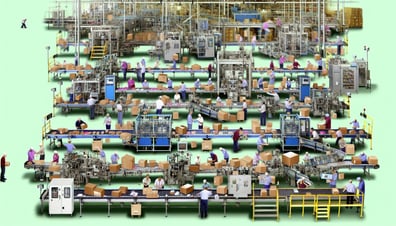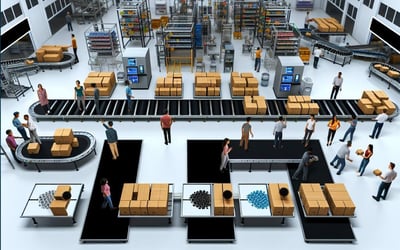Resource Allocation Algorithms
Production schedulers play a vital role in ensuring that resources such as machines, materials, and manpower are utilized optimally to meet customer demands while minimizing costs and maximizing productivity.
In this blog, we'll look into the intricate world of resource allocation algorithms in scheduling, focusing on how modern tools like PlanetTogether, integrated with leading ERP, SCM, and MES systems such as SAP, Oracle, Microsoft, Kinaxis, and Aveva, are revolutionizing the process.

Resource Allocation in Packaging Manufacturing
Resource allocation in packaging manufacturing involves assigning available resources to various production tasks in the most efficient and cost-effective manner. These resources may include production lines, equipment, raw materials, labor, and time. The goal is to balance production capacity with demand while considering factors such as production constraints, lead times, inventory levels, and order priorities.

Challenges in Resource Allocation
Several challenges make resource allocation in packaging manufacturing a complex task:
Dynamic Demand: Fluctuations in customer demand require schedulers to adapt quickly and make real-time adjustments to production schedules.
Production Constraints: Limited availability of resources, such as machine capacity, labor availability, and material availability, poses constraints on scheduling decisions.
Optimization Goals: Schedulers must balance conflicting objectives such as minimizing production costs, maximizing resource utilization, meeting delivery deadlines, and minimizing inventory levels.
Complexity of Operations: Packaging manufacturing involves multiple production processes, setups, changeovers, and sequencing requirements, adding to the complexity of scheduling.

Resource Allocation Algorithms
To address these challenges, advanced resource allocation algorithms are employed. These algorithms leverage mathematical optimization techniques, heuristic methods, and artificial intelligence to generate optimal or near-optimal production schedules. Some common algorithms used in packaging manufacturing scheduling include:
Genetic Algorithms: Inspired by the process of natural selection, genetic algorithms iteratively evolve a set of potential solutions to find the best schedule based on predefined fitness criteria.
Simulated Annealing: This probabilistic optimization algorithm mimics the process of annealing in metallurgy to find the global optimum by allowing "bad" moves early in the search and gradually reducing the probability of such moves.
Tabu Search: Tabu search maintains a short-term memory of past solutions to avoid revisiting them while exploring the solution space, thus facilitating a more efficient search for the optimal schedule.
Constraint Programming: Constraint programming formulates the scheduling problem as a set of constraints and variables, allowing for the efficient exploration of feasible solutions within the constraint boundaries.

Integration with ERP, SCM, and MES Systems
The integration of advanced scheduling tools like PlanetTogether with enterprise resource planning (ERP), supply chain management (SCM), and manufacturing execution systems (MES) brings added value to packaging manufacturing facilities. By seamlessly connecting scheduling with other business processes, integration enables:
Real-Time Data Exchange: Integration ensures that scheduling decisions are based on up-to-date information on orders, inventory levels, production capacities, and resource availability, improving decision-making accuracy.
Streamlined Operations: Automated data transfer between scheduling software and ERP, SCM, and MES systems reduces manual data entry errors and streamlines communication between departments, leading to smoother operations.
Enhanced Visibility: Integration provides stakeholders with comprehensive visibility into the entire production process, from order entry to delivery, enabling better coordination and proactive problem-solving.
Continuous Improvement: By leveraging data analytics and machine learning capabilities, integrated systems can identify trends, patterns, and bottlenecks in production processes, facilitating continuous improvement initiatives.
Resource allocation algorithms play a crucial role in optimizing scheduling decisions in packaging manufacturing. By leveraging advanced algorithms and integrating scheduling software like PlanetTogether with ERP, SCM, and MES systems, production schedulers can achieve greater efficiency, flexibility, and responsiveness in meeting customer demands while minimizing costs and maximizing productivity.
The successful implementation of such integration initiatives requires collaboration between IT, operations, and management teams to ensure seamless connectivity and alignment with business objectives. As packaging manufacturing continues to evolve, the adoption of innovative scheduling solutions will be key to staying competitive in the market.
Are you ready to take your manufacturing operations to the next level? Contact us today to learn more about how PlanetTogether can help you achieve your goals and drive success in your industry.